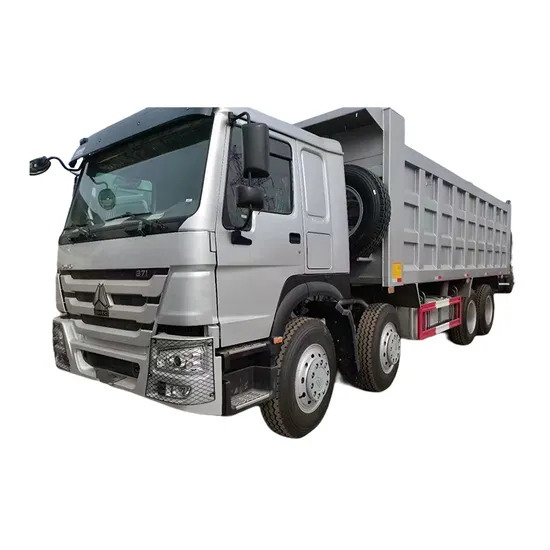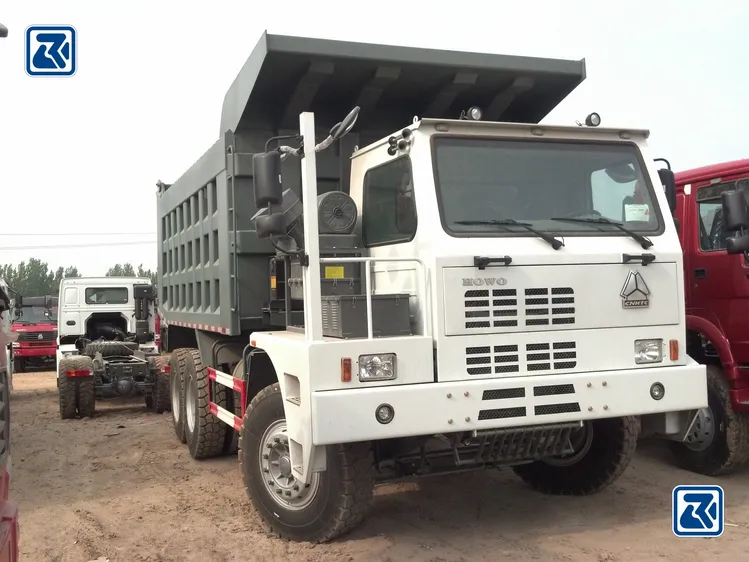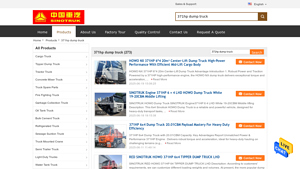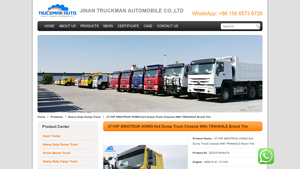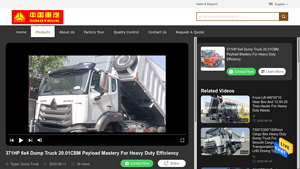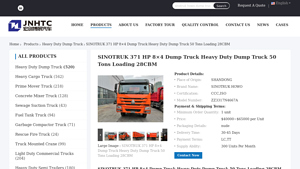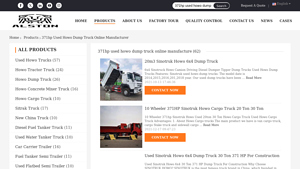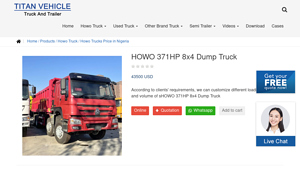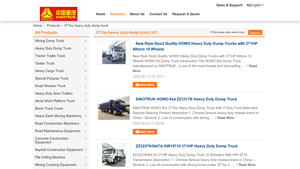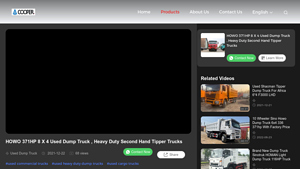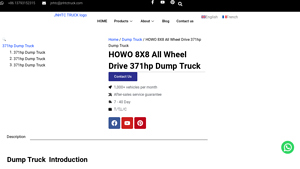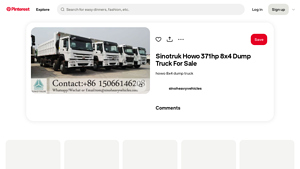Introduction: Navigating the Global Market for 371hp Heavy Duty Dump Truck
In an increasingly competitive global market, sourcing the right 371hp heavy duty dump truck can pose significant challenges for international B2B buyers, especially those operating in diverse regions such as Africa, South America, the Middle East, and Europe. The demand for these robust vehicles, capable of handling heavy loads and rough terrains, is rising as industries like construction and mining expand. However, navigating the complexities of product specifications, supplier reliability, and cost efficiency can be daunting.
This comprehensive guide serves as an essential resource for B2B buyers seeking to make informed purchasing decisions regarding 371hp heavy duty dump trucks. We delve into various types of dump trucks available, their specific applications across different industries, and critical factors for supplier vetting. Additionally, we provide insights into pricing structures and total cost of ownership, enabling buyers to assess the long-term value of their investment.
By equipping decision-makers with the knowledge they need to evaluate options effectively, this guide empowers businesses to select the right dump truck that meets their operational needs while maximizing ROI. Whether you are in Nigeria, Germany, or elsewhere, understanding the nuances of this market will enhance your procurement strategy and drive success in your projects.
Understanding 371hp Heavy Duty Dump Truck Types and Variations
| Type Name | Key Distinguishing Features | Primary B2B Applications | Brief Pros & Cons for Buyers |
|---|---|---|---|
| HOWO 6×4 Tipper Dump Truck | 371HP engine, 10-speed gearbox, 20m³ cargo capacity | Construction, mining, road works | Pros: High load capacity, reliable performance. Cons: May require specific maintenance expertise. |
| HOWO 8×4 Heavy Duty Dump Truck | Enhanced stability, 8-wheel drive, larger cargo volume (up to 40 tons) | Mining, heavy civil engineering | Pros: Superior traction, ideal for rough terrain. Cons: Higher initial investment. |
| Mining Tipper Dump Truck | Designed for rugged conditions, up to 70 tons payload capacity | Mining operations, quarry transport | Pros: Robust design for extreme loads. Cons: Heavier, may have higher fuel consumption. |
| Center-Lift Dump Truck | Mid-lift design, balanced load distribution | Urban construction, waste management | Pros: Efficient unloading, good for tight spaces. Cons: Limited payload compared to others. |
| U-Shape Cargo Dump Truck | U-shaped cargo box for better load stability | Transportation of sand, gravel, clay | Pros: Lower center of gravity, reduces spillage. Cons: May not be suitable for all materials. |
What Are the Key Characteristics of the HOWO 6×4 Tipper Dump Truck?
The HOWO 6×4 Tipper Dump Truck is engineered for versatility and strength, featuring a 371HP engine and a 10-speed gearbox that allows for efficient hauling over various terrains. With a cargo capacity of 20m³, it is well-suited for construction projects and road works. Buyers should consider its reliability and proven performance, but they should also be aware of the need for specialized maintenance to keep the truck operating optimally.
How Does the HOWO 8×4 Heavy Duty Dump Truck Stand Out?
The HOWO 8×4 Heavy Duty Dump Truck is built for heavy loads and challenging environments, capable of carrying up to 40 tons. Its enhanced stability and 8-wheel drive make it ideal for mining and heavy civil engineering projects. While it offers superior traction and durability, potential buyers should evaluate the higher initial investment and ongoing operational costs associated with this model.
What Makes the Mining Tipper Dump Truck Ideal for Rugged Conditions?
The Mining Tipper Dump Truck is specifically designed for extreme conditions, featuring a payload capacity of up to 70 tons. This truck excels in mining operations and quarry transport, thanks to its robust construction. While it provides exceptional load-bearing capabilities, buyers should be mindful of the increased weight, which may lead to higher fuel consumption.
Why Choose a Center-Lift Dump Truck for Urban Applications?
The Center-Lift Dump Truck features a unique mid-lift design that allows for balanced load distribution, making it particularly effective in urban construction and waste management scenarios. Its efficient unloading mechanism is beneficial for operations in tight spaces. However, buyers should consider that its payload capacity may be limited compared to other heavy-duty options.
What Are the Advantages of the U-Shape Cargo Dump Truck?
The U-Shape Cargo Dump Truck is designed with a U-shaped cargo box that enhances load stability, making it suitable for transporting materials like sand, gravel, and clay. Its lower center of gravity reduces the risk of spillage during transit. While this design offers significant advantages, it may not be applicable for all types of materials, which is a consideration for prospective buyers.
Key Industrial Applications of 371hp Heavy Duty Dump Truck
| Industry/Sector | Specific Application of 371hp Heavy Duty Dump Truck | Value/Benefit for the Business | Key Sourcing Considerations for this Application |
|---|---|---|---|
| Construction | Transporting construction materials (sand, gravel, concrete) | Increases efficiency in material transport, reducing project time | Durability, payload capacity, and compatibility with terrain |
| Mining | Hauling ore and waste in mining operations | Optimizes material handling, enhances productivity | Load capacity, fuel efficiency, and ruggedness for rough terrain |
| Agriculture | Moving soil, fertilizers, and produce | Supports agricultural productivity and timely delivery | Versatility, reliability, and ease of maintenance |
| Waste Management | Collecting and transporting waste materials | Enhances waste management efficiency and compliance | Load capacity, operational cost, and environmental compliance |
| Road Maintenance and Repair | Transporting asphalt and road repair materials | Ensures timely road repairs, improving infrastructure reliability | Payload capacity, operational efficiency, and fuel economy |
How is the 371hp Heavy Duty Dump Truck Used in Construction?
In the construction sector, the 371hp Heavy Duty Dump Truck is primarily used for transporting essential materials such as sand, gravel, and concrete. This vehicle is designed to handle heavy loads, significantly improving operational efficiency and reducing project timelines. Buyers in this sector must consider the truck’s durability and payload capacity, ensuring it can withstand the rigors of construction sites, particularly in regions with challenging terrains like Africa and South America.
What Role Does the 371hp Dump Truck Play in Mining Operations?
In mining, the 371hp Heavy Duty Dump Truck is indispensable for hauling ore and waste materials. Its robust engine and high payload capacity enable it to navigate rough terrains while transporting heavy loads, thus optimizing material handling processes. For international buyers, especially in the Middle East and Africa, sourcing considerations should focus on the truck’s fuel efficiency and ruggedness, as these factors directly impact operational costs and productivity in remote mining sites.
How Does the 371hp Dump Truck Benefit Agriculture?
In agriculture, the 371hp Heavy Duty Dump Truck is utilized for moving soil, fertilizers, and harvested produce. This versatility supports various agricultural operations and enhances productivity by ensuring timely deliveries. Buyers in this sector should prioritize reliability and ease of maintenance, as these trucks often operate in rural areas where service access may be limited. Effective sourcing can lead to improved agricultural outputs and operational efficiency.
What is the Importance of the 371hp Dump Truck in Waste Management?
For waste management, the 371hp Heavy Duty Dump Truck is essential for collecting and transporting waste materials. Its high load capacity allows for efficient waste handling, contributing to better waste management practices and compliance with environmental regulations. B2B buyers should consider operational costs and environmental compliance when sourcing these trucks, particularly in urban settings where waste collection efficiency is critical.
How is the 371hp Dump Truck Used in Road Maintenance?
In road maintenance and repair, the 371hp Heavy Duty Dump Truck transports asphalt and other road repair materials. This capability ensures timely repairs, which is vital for maintaining infrastructure reliability. Buyers should focus on the truck’s payload capacity and operational efficiency, as these elements are crucial for minimizing downtime and maximizing productivity in roadwork projects across Europe and other regions.
3 Common User Pain Points for ‘371hp Heavy Duty Dump Truck’ & Their Solutions
Scenario 1: Limited Payload Capacity for Heavy Loads
The Problem: Many B2B buyers in industries such as construction and mining often face the challenge of transporting heavy materials. A common issue with dump trucks is inadequate payload capacity, which can lead to multiple trips, increased operational costs, and time delays. For instance, a construction company in Nigeria might find that a standard dump truck cannot handle the weight of construction debris or raw materials, impacting project timelines and budget constraints.
The Solution: When sourcing a 371hp Heavy Duty Dump Truck, it is crucial to verify the truck’s payload specifications. The Sinotruk HOWO 371hp model, for example, is designed to carry loads up to 30 tons with a capacity of 20.01CBM. Buyers should ensure they select trucks with robust chassis and high-quality tires that can withstand heavy loads. Additionally, consider customizing the cargo box design to suit specific material types (like gravel or clay) which can enhance stability and reduce wear on the vehicle. Regular maintenance checks, focusing on the suspension system and tire condition, will also help in maximizing payload efficiency.
Scenario 2: High Operational Costs Due to Fuel Inefficiency
The Problem: Fuel efficiency is a critical concern for B2B buyers who rely on heavy-duty trucks for their operations. A construction firm in South America may discover that their dump truck consumes too much fuel, leading to inflated operational costs that negatively affect profit margins. The challenge is exacerbated when fuel prices fluctuate, making it essential to have a vehicle that minimizes consumption without sacrificing performance.
The Solution: To mitigate fuel inefficiency, buyers should consider the engine specifications and technology of the 371hp Heavy Duty Dump Truck. The Sinotruk HOWO model features a WD615.47 engine, which is designed for optimal performance. Buyers should look for trucks equipped with advanced fuel management systems that can optimize consumption based on load and terrain. Implementing a driver training program focused on efficient driving techniques can also contribute to fuel savings. Additionally, regular maintenance, including timely oil changes and tire pressure checks, can improve fuel economy significantly.
Scenario 3: Difficulty in Sourcing Spare Parts and Maintenance Services
The Problem: After purchasing a heavy-duty dump truck, many buyers encounter challenges related to sourcing spare parts and maintenance services. This is particularly prevalent in regions with limited access to quality parts or service providers, such as parts of Africa or the Middle East. A construction company may face downtime if their truck requires repairs and they cannot find the necessary components quickly.
The Solution: To alleviate concerns regarding spare parts availability, B2B buyers should partner with reputable manufacturers or suppliers who offer comprehensive after-sales support. When selecting a 371hp Heavy Duty Dump Truck, buyers should inquire about the availability of genuine spare parts and the manufacturer’s distribution network in their region. Establishing relationships with local service centers that are authorized by the manufacturer can ensure that maintenance is performed correctly and efficiently. Additionally, buyers can stock essential spare parts based on their operational needs to minimize downtime and ensure continuous workflow.
Strategic Material Selection Guide for 371hp Heavy Duty Dump Truck
What Are the Most Common Materials Used in 371hp Heavy Duty Dump Trucks?
When selecting materials for the 371hp Heavy Duty Dump Truck, it is crucial to consider their properties, advantages, and potential limitations. The choice of materials directly impacts the truck’s performance, durability, and overall operational efficiency. Below, we analyze four common materials used in the construction of these dump trucks.
Steel: The Backbone of Heavy Duty Trucks
Key Properties: Steel is known for its high tensile strength and durability, making it suitable for heavy-duty applications. It can withstand high temperatures and pressure, which is essential for the demanding environments in which dump trucks operate.
Pros & Cons: Steel is relatively cost-effective and readily available, making it a popular choice. However, it is prone to corrosion if not properly treated or coated, which can lead to increased maintenance costs over time. The manufacturing complexity can also vary depending on the steel grade and treatment processes.
Impact on Application: Steel is compatible with various media, including sand, gravel, and other heavy materials. Its strength ensures that the truck can handle substantial loads without compromising structural integrity.
Considerations for International Buyers: Buyers from regions like Africa and South America should ensure that the steel used complies with local standards, such as ASTM or DIN, to guarantee quality and safety.
Aluminum: Lightweight and Corrosion-Resistant
Key Properties: Aluminum is lightweight yet strong, offering excellent corrosion resistance. It performs well in various temperature ranges, making it suitable for diverse climates.
Pros & Cons: The primary advantage of aluminum is its weight reduction, which can enhance fuel efficiency and payload capacity. However, it is generally more expensive than steel and may not offer the same level of strength under extreme conditions.
Impact on Application: Aluminum is ideal for applications where weight savings are critical, such as in the construction of dump truck bodies. Its resistance to corrosion also ensures longevity, especially in humid or coastal environments.
Considerations for International Buyers: Buyers should verify that aluminum components meet international standards to ensure compatibility with local regulations and operational requirements.
Composite Materials: The Future of Truck Manufacturing?
Key Properties: Composites, often made from a combination of materials like fiberglass and resin, provide excellent strength-to-weight ratios and are resistant to corrosion and chemicals.
Pros & Cons: Composites can significantly reduce weight and improve fuel efficiency. However, they can be more expensive to manufacture and may require specialized processes for repairs and replacements.
Impact on Application: Composites are particularly beneficial for reducing the overall weight of the dump truck, allowing for increased payloads. Their resistance to environmental factors makes them suitable for various applications.
Considerations for International Buyers: Buyers should be aware of the specific manufacturing processes and standards for composites, which may differ from traditional materials. Compliance with international standards is essential for ensuring quality.
Rubber: Essential for Tires and Suspension Systems
Key Properties: Rubber is flexible, durable, and offers excellent traction. It can withstand a range of temperatures and is resistant to wear and tear.
Pros & Cons: The primary advantage of rubber is its ability to absorb shocks, providing a smoother ride and better handling. However, it can degrade over time due to exposure to UV light and harsh chemicals.
Impact on Application: Rubber is critical for tires and suspension systems, directly affecting the truck’s performance on rough terrains. Properly selected rubber compounds can enhance durability and traction.
Considerations for International Buyers: Buyers should consider local climate conditions when selecting rubber components, as temperature extremes can affect performance. Compliance with international tire standards is also vital for safety.
Summary Table of Material Selection for 371hp Heavy Duty Dump Truck
| Material | Typical Use Case for 371hp Heavy Duty Dump Truck | Key Advantage | Key Disadvantage/Limitation | Relative Cost (Low/Med/High) |
|---|---|---|---|---|
| Steel | Chassis and structural components | High strength and durability | Prone to corrosion without treatment | Low |
| Aluminum | Dump truck body and panels | Lightweight, enhances fuel efficiency | More expensive than steel | Med |
| Composite | Body panels and lightweight components | Excellent strength-to-weight ratio | Higher manufacturing costs | High |
| Rubber | Tires and suspension systems | Shock absorption and traction | Degrades over time due to environmental factors | Med |
By understanding the properties, advantages, and limitations of these materials, international B2B buyers can make informed decisions that align with their operational needs and regional requirements.
In-depth Look: Manufacturing Processes and Quality Assurance for 371hp Heavy Duty Dump Truck
What Are the Key Stages in the Manufacturing Process of a 371hp Heavy Duty Dump Truck?
The manufacturing process of the 371hp Heavy Duty Dump Truck involves several critical stages, each designed to ensure the vehicle’s performance, durability, and reliability. Here’s a detailed look at these stages:
1. Material Preparation: What Materials Are Used in the Construction?
The first stage involves sourcing high-quality raw materials. For the 371hp Heavy Duty Dump Truck, common materials include high-strength steel for the chassis and body, aluminum for the cabin, and specialized alloys for engine components. Suppliers often adhere to international standards to ensure material integrity. Rigorous testing of materials is done to confirm they can withstand heavy loads and harsh environmental conditions.
2. Forming: How Are Components Shaped and Formed?
Once materials are prepared, the next phase is forming. This involves processes such as stamping, bending, and welding to create various truck components. Advanced machinery, including CNC (Computer Numerical Control) machines, is utilized to ensure precision in shaping parts like the chassis, cargo box, and axles. Automation in this stage helps reduce human error and enhances the uniformity of parts.
3. Assembly: What Is the Assembly Process Like?
The assembly process is where various components come together to form the finished vehicle. Skilled technicians follow detailed assembly instructions, ensuring that each part fits perfectly. Key components such as the engine, transmission, axles, and suspension system are installed during this stage. The assembly line is designed for efficiency, allowing for simultaneous assembly of multiple trucks while maintaining quality control standards.
4. Finishing: How Is the Final Product Prepared for Delivery?
After assembly, the truck undergoes finishing processes, which include painting, surface treatment, and quality inspections. The painting process not only enhances aesthetics but also provides protection against corrosion and wear. Surface treatments may include sandblasting and coating to ensure longevity. This stage is crucial for ensuring that the truck is ready for the rigors of heavy-duty use.
What Quality Assurance Practices Are Implemented for Heavy Duty Dump Trucks?
Quality assurance (QA) is integral to the manufacturing process, particularly for heavy-duty vehicles like the 371hp Dump Truck. The following practices ensure that each truck meets stringent quality standards:
1. What International Standards Guide Quality Control?
Manufacturers often comply with international standards such as ISO 9001, which focuses on quality management systems. Other relevant certifications may include CE marking, indicating compliance with European health, safety, and environmental protection standards. These certifications provide buyers with assurance that the manufacturing process meets recognized quality benchmarks.
2. What Are the Key Quality Control Checkpoints?
Quality control is implemented at various checkpoints throughout the manufacturing process:
- Incoming Quality Control (IQC): Materials and components are inspected upon arrival to ensure they meet specified standards.
- In-Process Quality Control (IPQC): Ongoing inspections occur during the manufacturing process to identify any deviations from quality standards.
- Final Quality Control (FQC): Once the truck is fully assembled, a comprehensive inspection is conducted to evaluate performance, safety, and compliance with specifications.
3. What Testing Methods Are Commonly Used?
Common testing methods for the 371hp Heavy Duty Dump Truck include:
- Performance Testing: Assessing engine performance, braking efficiency, and load capacity.
- Durability Testing: Subjecting the truck to rigorous conditions to evaluate its resilience under stress.
- Safety Testing: Ensuring that safety features, such as braking systems and stability controls, operate effectively.
How Can B2B Buyers Verify Supplier Quality Control?
For international B2B buyers, particularly those from diverse regions such as Africa, South America, the Middle East, and Europe, verifying a supplier’s quality control practices is vital. Here are actionable steps:
1. What Should Buyers Look for in Supplier Audits?
Conducting supplier audits can provide insights into their manufacturing processes and quality control measures. Buyers should look for:
- Compliance with international standards.
- Documentation of quality control processes and inspection reports.
- Evidence of regular training for quality assurance personnel.
2. How Important Are Third-Party Inspections?
Engaging third-party inspection services can add an extra layer of assurance. These independent auditors evaluate manufacturing practices and quality standards objectively. Buyers should consider asking for third-party inspection reports as part of their procurement process.
3. What Documentation Should Be Requested?
Buyers should request comprehensive documentation from suppliers, including:
- Quality control manuals.
- Certificates of compliance with international standards.
- Detailed inspection and test reports for each unit produced.
What Are the Quality Control Nuances for International Buyers?
International buyers should be aware of specific nuances that may affect quality control:
- Regulatory Compliance: Different countries have varying regulations regarding vehicle standards. Understanding local requirements is essential for ensuring compliance.
- Cultural Considerations: Cultural differences may influence communication and expectations regarding quality. Establishing clear lines of communication can help bridge these gaps.
- Logistical Challenges: Transporting heavy-duty vehicles internationally can present logistical challenges. Buyers should ensure that suppliers have robust processes for handling shipping and customs clearance.
By understanding the manufacturing processes and quality assurance practices of the 371hp Heavy Duty Dump Truck, B2B buyers can make informed decisions that align with their operational needs and standards. This knowledge not only fosters trust in supplier relationships but also ensures that the vehicles they procure are reliable and capable of meeting the demands of heavy-duty applications.
Practical Sourcing Guide: A Step-by-Step Checklist for ‘371hp Heavy Duty Dump Truck’
To assist B2B buyers in the procurement of a 371hp Heavy Duty Dump Truck, this practical sourcing guide provides a clear checklist of essential steps to ensure a successful purchase. Each step is designed to address critical factors in the buying process, helping you make informed decisions tailored to your business needs.
Step 1: Define Your Technical Specifications
Before exploring suppliers, establish the specific technical requirements for your dump truck. Consider factors such as engine power, payload capacity, and chassis configuration. This clarity will guide you in selecting models that meet your operational demands, particularly in regions with varying terrain and load requirements.
- Key Specifications to Consider:
- Engine Type and Power: Ensure it meets your hauling needs and complies with local emission standards.
- Load Capacity: Assess your typical load sizes to choose an appropriate model.
Step 2: Research Potential Suppliers
Conduct thorough research to identify reputable manufacturers and suppliers of the 371hp Heavy Duty Dump Truck. Look for companies with a solid track record, quality products, and positive customer reviews. This groundwork is vital to ensure you partner with reliable entities.
- Where to Look:
- Online Marketplaces: Platforms like Alibaba or specialized truck export websites.
- Industry Events: Attend trade shows and exhibitions to meet suppliers face-to-face.
Step 3: Evaluate Supplier Certifications and Compliance
Verify that potential suppliers hold necessary certifications and comply with international manufacturing standards. This step is crucial to ensure product quality and reliability, especially in demanding environments like construction sites or mining operations.
- Important Certifications to Check:
- ISO Certification: Indicates adherence to quality management standards.
- Local Compliance: Ensure compliance with regional regulations, particularly in your target markets.
Step 4: Request Detailed Quotations
Once you have shortlisted suppliers, request detailed quotations that include pricing, specifications, and terms of sale. This will allow you to compare offers comprehensively and assess the overall value of each proposal.
- What to Look For:
- Breakdown of Costs: Ensure clarity on unit prices, shipping, and potential customs duties.
- Warranty and After-Sales Support: Understand the warranty terms and the availability of parts and services post-purchase.
Step 5: Conduct Supplier Audits
If possible, conduct audits or site visits to the supplier’s manufacturing facilities. This step provides insights into their production processes, quality control measures, and overall operational standards, ensuring they align with your expectations.
- What to Assess:
- Manufacturing Capability: Evaluate the technology and machinery used.
- Quality Control Processes: Ensure rigorous testing is performed on finished products.
Step 6: Negotiate Terms and Conditions
After selecting a preferred supplier, negotiate the terms and conditions of the sale. This includes payment terms, delivery timelines, and any special requests or modifications to the truck.
- Key Points to Discuss:
- Payment Terms: Explore options like letters of credit or installment payments.
- Delivery Schedule: Ensure timelines align with your project schedules to avoid delays.
Step 7: Finalize the Purchase and Arrange Logistics
Once terms are agreed upon, finalize the purchase and organize logistics for transportation. Ensure all documentation is in order to facilitate a smooth import process, especially if sourcing internationally.
- Documentation to Prepare:
- Purchase Agreement: Clearly outline terms and conditions.
- Shipping and Customs Documentation: Ensure compliance with import regulations in your country.
By following this checklist, B2B buyers can navigate the complexities of sourcing a 371hp Heavy Duty Dump Truck effectively, ensuring that they make informed decisions that support their operational needs.
Comprehensive Cost and Pricing Analysis for 371hp Heavy Duty Dump Truck Sourcing
What Are the Key Cost Components for Sourcing a 371hp Heavy Duty Dump Truck?
When sourcing a 371hp heavy-duty dump truck, understanding the cost structure is crucial for making informed purchasing decisions. The primary cost components include:
-
Materials: The quality and type of materials used in manufacturing the dump truck significantly impact costs. High-grade steel and durable components for the chassis and cargo box can increase upfront costs but may lead to lower maintenance expenses over time.
-
Labor: Labor costs can vary by region and manufacturer. Skilled labor in countries with higher wages will add to the overall price of the dump truck, while manufacturers in developing regions may offer lower labor costs, impacting the final pricing.
-
Manufacturing Overhead: This includes factory utilities, administrative expenses, and depreciation of manufacturing equipment. Efficient manufacturing processes can reduce overhead costs, potentially lowering the overall price for buyers.
-
Tooling: Custom tooling for specific designs or specifications can drive costs up. However, standard models may have lower tooling costs, making them more affordable options for buyers.
-
Quality Control (QC): Rigorous QC processes ensure reliability and durability, which can lead to higher costs but ultimately provide peace of mind and reduce long-term operational costs due to fewer breakdowns.
-
Logistics: Transportation costs from the manufacturer to the buyer’s location can vary significantly based on distance, shipping methods, and Incoterms. Buyers should factor in these logistics costs when evaluating total pricing.
-
Margin: Manufacturers typically include a profit margin in their pricing. Understanding the industry standard margins can help buyers negotiate better deals.
How Do Price Influencers Affect the Cost of Dump Trucks?
Several factors influence the pricing of 371hp heavy-duty dump trucks:
-
Volume/MOQ (Minimum Order Quantity): Larger orders can often secure better pricing per unit. Suppliers may offer discounts for bulk purchases, making it advantageous for companies with large fleet requirements.
-
Specifications and Customization: Custom features such as specialized cargo boxes or enhanced safety features can increase costs. Buyers should clearly define their specifications to avoid unexpected charges.
-
Materials and Quality Certifications: Trucks built with higher-quality materials or those that comply with specific international standards (e.g., Euro 2 emissions standards) may come at a premium.
-
Supplier Factors: Reputation, reliability, and service offerings of the supplier can impact pricing. Established brands may charge more due to their proven track record, while newer entrants may offer competitive prices to gain market share.
-
Incoterms: The chosen Incoterm affects logistics costs and responsibilities. FOB (Free on Board) might lead to lower initial costs, while CIF (Cost, Insurance, and Freight) ensures the buyer pays a higher upfront cost but reduces risks related to transportation.
What Buyer Tips Can Help Optimize Costs?
-
Negotiation: Effective negotiation skills can lead to significant savings. Buyers should research market prices, understand their leverage, and be prepared to negotiate terms that benefit their organization.
-
Cost-Efficiency: Consider the Total Cost of Ownership (TCO) rather than just the purchase price. This includes maintenance, fuel consumption, and resale value, which can significantly impact long-term expenses.
-
Pricing Nuances for International B2B Buyers: Buyers in regions like Africa, South America, the Middle East, and Europe should be aware of import duties, local taxes, and currency fluctuations. Understanding these factors can help in budgeting accurately.
-
Seek Multiple Quotes: Obtaining quotes from multiple suppliers can provide a clearer picture of the market and help identify the best pricing and terms.
-
Long-Term Relationships: Building strong relationships with suppliers can lead to better pricing, priority service, and access to the latest products.
Conclusion
While indicative prices for 371hp heavy-duty dump trucks may vary based on the factors outlined, a comprehensive understanding of the cost structure and influencing elements can empower international B2B buyers to make strategic sourcing decisions. Careful consideration of these components will ultimately lead to more informed purchasing and potential savings.
Alternatives Analysis: Comparing 371hp Heavy Duty Dump Truck With Other Solutions
When evaluating heavy-duty transport solutions, it is crucial for B2B buyers to understand the landscape of available alternatives. The 371hp Heavy Duty Dump Truck, a robust option for transporting materials in construction and mining, competes with several other technologies and methods. Below, we compare the 371hp Heavy Duty Dump Truck with two viable alternatives: the 6×4 Heavy Duty Tipper Truck and the 8×4 Dump Truck.
| Comparison Aspect | 371Hp Heavy Duty Dump Truck | 6×4 Heavy Duty Tipper Truck | 8×4 Dump Truck |
|---|---|---|---|
| Performance | 371HP engine; 30 tons load capacity; ideal for rough terrains | 400HP engine; 25 tons load capacity; suitable for moderate conditions | 450HP engine; 40 tons load capacity; high performance for extreme conditions |
| Cost | Competitive pricing; lower initial investment | Higher initial costs; good long-term ROI | Highest initial costs; best suited for large-scale operations |
| Ease of Implementation | Standardized design; easy to integrate into existing fleets | Requires some training; moderate integration effort | Complex setup; may require extensive training |
| Maintenance | Moderate maintenance costs; widely available parts | Higher maintenance due to complexity; specialized service required | Higher costs; specialized parts and services needed |
| Best Use Case | Construction and mining in challenging terrains | Infrastructure projects and urban construction | Large-scale mining and heavy-duty hauling |
What are the Advantages and Disadvantages of the 6×4 Heavy Duty Tipper Truck?
The 6×4 Heavy Duty Tipper Truck is a strong alternative, particularly known for its slightly enhanced power of 400HP and moderate load capacity of 25 tons. Its design caters well to urban construction and infrastructure projects where maneuverability is essential. However, the initial cost is higher, and it requires moderate training for operators, which could impact the total cost of ownership. Maintenance can also be more complex, necessitating specialized services that may not be as widely available.
How Does the 8×4 Dump Truck Compare?
The 8×4 Dump Truck offers the highest power at 450HP and a load capacity of up to 40 tons, making it ideal for large-scale mining operations and extreme conditions. Its robust design allows for efficient transport of heavy materials over long distances. However, it comes with the highest initial investment and maintenance costs, along with a complex setup that may require significant operator training. This makes it less ideal for smaller operations or those with budget constraints.
How Can B2B Buyers Choose the Right Solution?
When selecting the appropriate dump truck solution, B2B buyers should consider their specific operational needs, budget constraints, and the type of terrain they will be working on. The 371hp Heavy Duty Dump Truck is a versatile option for those requiring a balance of performance and cost-effectiveness, while the 6×4 Tipper Truck may be better for urban applications. For buyers involved in extensive mining operations, the 8×4 Dump Truck may justify its higher costs with its superior performance and capacity. Analyzing these factors will guide buyers in making informed decisions that align with their business objectives.
Essential Technical Properties and Trade Terminology for 371hp Heavy Duty Dump Truck
What Are the Key Technical Properties of a 371hp Heavy Duty Dump Truck?
When considering the purchase of a 371hp heavy-duty dump truck, understanding its technical specifications is crucial for ensuring it meets operational needs. Here are some essential properties to consider:
-
Engine Specifications
The engine model, such as the WD615.47, provides a power output of 371 horsepower. This specification is vital as it determines the truck’s performance under heavy loads and challenging terrains. A powerful engine translates to better torque and acceleration, enhancing efficiency in construction and mining applications. -
Payload Capacity
Most 371hp dump trucks are designed with a payload capacity of around 30 tons. This capacity is critical for businesses in industries like construction and mining, where transporting heavy materials is routine. Knowing the payload capacity helps buyers assess whether the truck can handle their specific load requirements without compromising safety. -
Gearbox Configuration
The typical gearbox for a 371hp dump truck consists of 10 forward and 2 reverse gears. This configuration allows for better control and adaptability in various driving conditions, making it essential for operations that involve frequent stop-and-go scenarios, such as urban construction sites. -
Chassis and Axle Design
A robust chassis design, often with a 6×4 configuration, contributes to the truck’s stability and load-bearing capabilities. The front and rear axle specifications (e.g., HF9 front axle at 9 tons and HC16 rear axle at 16 tons) are crucial as they affect the vehicle’s handling, durability, and overall performance, especially on uneven terrains. -
Cargo Box Dimensions
The cargo box typically measures around 5600mm x 2300mm x 1400mm, offering approximately 18m³ of volume. Understanding these dimensions is essential for determining the type and volume of materials that can be transported, which is particularly important for companies involved in bulk material handling.
What Common Trade Terms Should Buyers Know When Purchasing a 371hp Heavy Duty Dump Truck?
Navigating the procurement process involves familiarity with industry jargon. Here are some common terms that buyers should understand:
-
OEM (Original Equipment Manufacturer)
This term refers to the company that manufactures the original product. In the context of dump trucks, understanding OEM relationships is crucial for sourcing genuine parts and ensuring warranty coverage. -
MOQ (Minimum Order Quantity)
This is the smallest quantity of a product that a supplier is willing to sell. Knowing the MOQ is important for budget planning and inventory management, especially for businesses looking to purchase multiple units. -
RFQ (Request for Quotation)
An RFQ is a document sent to suppliers requesting price quotes for specific products. For buyers, issuing an RFQ can help in comparing costs and making informed purchasing decisions based on competitive pricing. -
Incoterms (International Commercial Terms)
These are a set of international rules that define the responsibilities of buyers and sellers regarding the delivery of goods. Familiarity with Incoterms helps buyers understand shipping costs, risks, and delivery timelines, which is essential for logistical planning. -
Lead Time
This term refers to the time it takes from placing an order to receiving the product. Understanding lead times is vital for project planning and ensuring that equipment is available when needed. -
Warranty Terms
Warranty terms specify the coverage period and conditions under which repairs or replacements will be provided. Knowing the warranty terms is critical for assessing long-term investment risks and maintenance costs.
By grasping these technical properties and trade terms, B2B buyers can make informed decisions when investing in 371hp heavy-duty dump trucks, ensuring they select the right equipment for their operational needs.
Navigating Market Dynamics and Sourcing Trends in the 371hp Heavy Duty Dump Truck Sector
What Are the Current Market Dynamics and Key Trends in the 371hp Heavy Duty Dump Truck Sector?
The 371hp heavy-duty dump truck market is experiencing significant growth driven by several global factors. Infrastructure development in emerging markets, particularly in Africa and South America, is a key catalyst, as governments prioritize road construction and urbanization projects. Additionally, the mining sector’s expansion in regions like the Middle East and parts of Europe further fuels demand for robust and reliable dump trucks capable of handling heavy loads and challenging terrains.
Emerging technologies are reshaping the sourcing landscape. B2B buyers are increasingly leveraging digital platforms for procurement, allowing for streamlined communication and enhanced transparency in the supply chain. The rise of data analytics and IoT solutions is enabling companies to monitor vehicle performance and maintenance needs in real-time, thereby reducing downtime and operational costs. Furthermore, the trend toward customization is becoming prominent, with manufacturers offering tailored solutions to meet specific regional requirements, such as adjusting load capacities and enhancing engine performance for local conditions.
As international buyers navigate this evolving market, they must also consider geopolitical factors that may influence pricing and availability, such as trade policies and tariffs. Building strong relationships with suppliers and understanding the nuances of regional markets will be crucial for securing favorable terms and ensuring reliable product delivery.
How Is Sustainability and Ethical Sourcing Shaping the 371hp Heavy Duty Dump Truck Market?
Sustainability is becoming an increasingly critical factor in the procurement of heavy-duty dump trucks. As environmental regulations tighten globally, B2B buyers are prioritizing vehicles that minimize their carbon footprint. Manufacturers are responding by investing in more fuel-efficient engines and adopting greener technologies, such as hybrid systems. The push for sustainable operations is not just about compliance; it is also about enhancing brand reputation and meeting the expectations of socially-conscious stakeholders.
Ethical sourcing is equally important, particularly in regions where supply chains may be under scrutiny. Buyers should look for suppliers that adhere to ethical labor practices and demonstrate a commitment to community development. Certifications for environmentally friendly materials and production processes are valuable indicators of a supplier’s dedication to sustainability. For instance, using recyclable materials in truck production not only reduces waste but also aligns with global sustainability goals.
By prioritizing sustainability and ethical sourcing, B2B buyers can foster long-term partnerships with manufacturers that share their values, ultimately leading to improved market positioning and customer loyalty.
What Is the Evolution of the 371hp Heavy Duty Dump Truck?
The 371hp heavy-duty dump truck has evolved significantly over the decades, reflecting advancements in technology and changing market demands. Initially designed for basic hauling tasks, these vehicles have transformed into sophisticated machines equipped with high-performance engines and advanced hydraulic systems. The introduction of the 371hp engine was a game-changer, providing the power necessary for heavy-duty applications across various industries, including construction, mining, and logistics.
As safety and efficiency have become paramount, modern dump trucks now feature enhanced braking systems, improved suspension, and driver assistance technologies. The evolution of these vehicles is not merely about power but also about adaptability to diverse operating environments, which is crucial for international buyers who must navigate varying terrain and regulatory requirements. Today, the 371hp dump truck stands as a testament to engineering innovation, blending power, reliability, and efficiency to meet the needs of a dynamic global market.
Frequently Asked Questions (FAQs) for B2B Buyers of 371hp Heavy Duty Dump Truck
-
How do I assess the quality of a 371hp Heavy Duty Dump Truck before purchasing?
To ensure the quality of a 371hp Heavy Duty Dump Truck, review the manufacturer’s reputation, certifications, and quality control processes. Request documentation of previous projects and testimonials from other B2B buyers. It’s advisable to conduct a factory visit if possible or engage a third-party inspection service to evaluate the trucks’ build quality and performance metrics. Additionally, inquire about warranties and after-sales support, as these factors can reflect the manufacturer’s confidence in their product. -
What is the best way to determine the right specifications for my needs?
Identifying the right specifications for your 371hp Heavy Duty Dump Truck depends on your operational requirements. Consider factors such as payload capacity, terrain type, and the materials you plan to transport. Engage with suppliers to discuss your specific applications and any customization options. They can provide insights into features like engine performance, cabin comfort, and cargo box design that best suit your operational context, ensuring you select a truck that enhances productivity. -
What customization options are available for the 371hp Heavy Duty Dump Truck?
Customization options for the 371hp Heavy Duty Dump Truck can include modifications to the cargo box design, axle configurations, and engine specifications. Many manufacturers offer bespoke solutions based on regional requirements, such as adapting the truck for off-road conditions or varying load capacities. Discuss your specific needs with suppliers to explore available options, including enhanced safety features or tailored tire specifications to optimize performance in your operational environment. -
What is the minimum order quantity (MOQ) for purchasing these trucks?
The minimum order quantity (MOQ) for 371hp Heavy Duty Dump Trucks typically varies by manufacturer and can range from one unit for smaller suppliers to multiple units for larger manufacturers. For B2B buyers, negotiating the MOQ may be possible, especially if you’re establishing a long-term partnership. It’s advisable to communicate your purchasing intentions clearly and discuss potential discounts or financing options based on volume orders. -
What payment terms should I expect when sourcing from international suppliers?
Payment terms for purchasing a 371hp Heavy Duty Dump Truck can vary significantly between suppliers. Common arrangements include a deposit upfront (often 30% to 50% of the total cost) with the balance due upon shipment or delivery. Some suppliers may offer financing options or letters of credit to facilitate the transaction. Always clarify payment terms in the contract and ensure you understand the implications of currency exchange rates and international banking fees. -
How can I ensure compliance with international shipping regulations?
To ensure compliance with international shipping regulations when purchasing a 371hp Heavy Duty Dump Truck, familiarize yourself with both your home country’s import regulations and those of the exporting country. Work closely with your supplier to gather necessary documentation, such as bills of lading, customs declarations, and export licenses. Engaging a logistics partner experienced in heavy machinery can also help navigate the complexities of shipping, ensuring compliance and timely delivery. -
What should I know about after-sales support and warranty?
After-sales support and warranty provisions are critical factors in B2B truck purchases. Most manufacturers offer a warranty period covering parts and labor, typically ranging from 12 to 36 months, depending on the model. Inquire about the specifics of the warranty, including what is covered and the process for claiming repairs. Additionally, assess the availability of spare parts and the supplier’s commitment to providing ongoing support, which can significantly affect the long-term operational efficiency of your trucks. -
What are the common logistical challenges in importing heavy-duty trucks?
Common logistical challenges in importing 371hp Heavy Duty Dump Trucks include customs clearance delays, transportation costs, and coordinating delivery timelines. To mitigate these challenges, ensure thorough planning and communication with your supplier regarding shipping schedules. Engage a freight forwarder who specializes in heavy equipment to manage logistics and customs processes efficiently. Understanding local regulations and potential tariffs can also help streamline the import process and prevent unexpected costs.
Important Disclaimer & Terms of Use
⚠️ Important Disclaimer
The information provided in this guide, including content regarding manufacturers, technical specifications, and market analysis, is for informational and educational purposes only. It does not constitute professional procurement advice, financial advice, or legal advice.
While we have made every effort to ensure the accuracy and timeliness of the information, we are not responsible for any errors, omissions, or outdated information. Market conditions, company details, and technical standards are subject to change.
B2B buyers must conduct their own independent and thorough due diligence before making any purchasing decisions. This includes contacting suppliers directly, verifying certifications, requesting samples, and seeking professional consultation. The risk of relying on any information in this guide is borne solely by the reader.
Top 10 371Hp Heavy Duty Dump Truck Manufacturers & Suppliers List
1. Sinotruk – HOWO NX 371HP Dump Truck
Domain: m.sinotruk-international.com
Registered: 2015 (10 years)
Introduction: 371HP dump truck, HOWO NX 6×4, 20m³ Center-Lift Dump Truck, powered by a 371HP high-performance engine, designed for heavy-duty transport tasks, robust power and traction, exceptional torque and acceleration, payload capacity of 19-20CBM, suitable for challenging terrains, customizable loading weights and volumes, reliable and sturdy structure.
2. SINOTRUK – 371HP 6×4 Dump Truck Chassis
Domain: truckmanauto.com
Registered: 2019 (6 years)
Introduction: {“Product Name”: “371HP SINOTRUK HOWO 6×4 Dump Truck Chassis With TRIANGLE Brand Tire”, “Product ID”: “ZZ3257N3647A”, “Engine”: “WD615.47, 371HP, EURO 2”, “Cabin”: “With one bed, A/C, intercooler cover, top warning lamp”, “Gearbox”: “HW19710, 10 forward and 2 reverse gear”, “Tire”: “12.00R20 or 13R22.5, TRIANGLE brand”, “Fuel Tank”: “400L”, “Cargo Box Dimensions”: “5600x2300x1400mm, 18m3, normal a…
3. Sinotruk – 371HP 6×4 Dump Truck
Domain: sinotruk-international.com
Registered: 2015 (10 years)
Introduction: 371HP 6×4 Dump Truck, 20.01CBM Payload, Heavy Duty Efficiency, Tipper Dump Truck, Unmatched Power & Performance, 371HP Engine, Robust Torque and Acceleration, Ideal for Heavy-Duty Hauling.
4. SINOTRUK – 371 HP 8×4 Dump Truck
Domain: jnhowotruck.com
Registered: 2024 (1 years)
Introduction: {“Product Name”: “SINOTRUK 371 HP 8×4 Dump Truck”,”Type”: “Heavy Duty Dump Truck”,”Loading Capacity”: “50 Tons”,”Box Size”: “8000×2300×1500 mm”,”Cubage”: “28 CBM”,”Material”: “Q345″,”Engine Model”: “WD615.47″,”Horsepower”: “371 HP”,”Power”: “273 Kw”,”Transmission”: “HW19710″,”Driving Type”: “8×4″,”GVW”: “30000 kg”,”Cab Model”: “HW76″,”Front Axle”: “HF9″,”Rear Axles”: “HC16″,”Wheels & Tyres”: “8.5/…
5. SINOTRUK – 371hp Used Howo Dump Truck
Domain: usedhowotrucks.com
Registered: 2021 (4 years)
Introduction: 371hp used Howo dump truck, model years: 2014, 2015, 2016, 2017, 2018, 6×4 configuration, suitable for construction and mining, strong hydraulic lift system, available in various capacities (20m3, 30 tons), competitive pricing, manufactured by SINOTRUK, a reputable brand in China since 1958.
6. HOWO – 371HP 8×4 Dump Truck
Domain: howosinotruk.com
Registered: 2011 (14 years)
Introduction: {“model”:”HOWO 371HP 8×4 Dump Truck”,”price”:”43500 USD”,”engine”:{“model”:”WD615.47″,”emission_standard”:”Euro II”,”type”:”4 stroke injection diesel engine”,”cylinders”:”6 cylinder in-line”,”features”:”water cooling, turbo-charging & inter cooling, mechanical high pressure oil pump system”,”maximum_output”:”371PS (273kW) at 2000 rpm”,”maximum_torque”:”1560Nm at 1200-1500rpm”,”bore”:”126mm”,”strok…
7. SINOTRUK – 371hp Heavy Duty Dump Truck
Domain: m.mining-dumptruck.com
Registered: 2018 (7 years)
Introduction: 371hp heavy duty dump truck, manufactured by SINOTRUK, features include: 6×4 configuration, low oil consumption, strong horsepower, 10 wheels, 18m3 tipper capacity, HW19710 transmission, ZF steering, and available in Euro 2 standards. Trusted performance designed for tough loads.
8. HOWO – 371HP 8X4 Used Dump Truck
Domain: usedtruckbus.com
Registered: 2019 (6 years)
Introduction: HOWO 371HP 8 X 4 Used Dump Truck, Heavy Duty Second Hand Tipper Trucks; Max speed: 80 km/h; Engine Model: WD615.47 (Steyr technology, made in China), water-cooled, four strokes, 6 cylinders in line.
9. HOWO – 8X8 All Wheel Drive Dump Truck
Domain: jnhtctruck.com
Registered: 2023 (2 years)
Introduction: Product Name: HOWO 8X8 All Wheel Drive 371hp Dump Truck
Cab: HW76 long cab, with one sleeper, air conditioner
Engine: SINOTRUK brand, WD416.47, 371hp, EUROII emission standard
Transmission: HW19710, Nu clearance: 1900Nm
Driving Axle: AC16, Casting steel axle, double driving axle, rated payload of each axle: 16 tons
Front Axle: HF9, with disc brake
Steering: ZF8118, hydraulic steering with power as…
10. Sinotruk – Howo 371hp 8×4 Dump Truck
Domain: pinterest.com
Registered: 2009 (16 years)
Introduction: Sinotruk Howo 371hp 8×4 Dump Truck For Sale
Strategic Sourcing Conclusion and Outlook for 371hp Heavy Duty Dump Truck
In the competitive landscape of heavy-duty transportation, strategic sourcing of the 371hp Heavy Duty Dump Truck offers significant advantages for international buyers. This model, renowned for its robust performance and adaptability, caters to a variety of applications, including construction and mining. With a payload capacity of up to 30 tons and efficient fuel consumption, it stands out as a reliable choice for businesses aiming to optimize operational efficiency while managing costs.
Engaging with reputable suppliers ensures access to high-quality vehicles and spare parts, which is crucial for maintaining operational uptime and minimizing maintenance costs. As demand for durable and efficient transportation solutions continues to rise in regions like Africa, South America, the Middle East, and Europe, buyers should leverage strategic sourcing to secure competitive pricing and favorable terms.
Looking ahead, the potential for growth in the heavy-duty truck market is promising. Buyers are encouraged to evaluate their specific needs and explore partnerships with established manufacturers like Sinotruk, which offers a range of customizable options to suit diverse operational requirements. By prioritizing strategic sourcing, businesses can position themselves for success in an evolving market.

